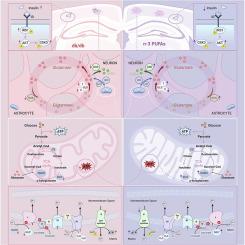膳食n-3多不饱和脂肪酸干预通过减轻皮质胰岛素抵抗、线粒体功能障碍和能量代谢障碍,改善db/db小鼠的认知功能障碍
IF 13
1区 综合性期刊
Q1 MULTIDISCIPLINARY SCIENCES
引用次数: 0
摘要
认知功能障碍是2型糖尿病(T2DM)的常见并发症。2型糖尿病患者的认知功能障碍不仅严重影响其生活质量,而且给其家庭和社会带来了沉重的负担。尽管T2DM及其相关认知功能障碍的患病率不断上升,但其潜在机制仍不完全清楚,并且仍然缺乏有效的治疗策略。这就迫切需要深入研究以阐明这些机制并开发新的治疗方法。目的探讨膳食中n-3多不饱和脂肪酸(n-3 PUFA)对糖尿病相关认知功能障碍的改善作用及其机制。方法在本研究中,我们采用多种糖尿病和认知障碍小鼠模型,探讨糖代谢紊乱对中心胰岛素信号通路和线粒体功能的影响。此外,我们用富含n-3 PUFA的饮食治疗db/db小鼠,并评估n-3 PUFA对胰岛素信号通路、线粒体功能和认知功能的影响,以阐明n-3 PUFA减轻糖尿病相关认知功能障碍的机制。采用western blot、免疫组织化学和逆转录聚合酶链反应检测靶蛋白和基因的表达水平。采用Morris水迷宫实验评价认知功能,采用弥散张量成像和尼氏染色分析脑结构和神经元损伤。透射电镜观察线粒体形态,代谢组学研究能量代谢变化。结果db/db小鼠表现出明显的胰岛素抵抗和脑皮层线粒体功能障碍。脑线粒体能量代谢异常和谷氨酸-谷氨酰胺循环中断是糖尿病相关认知功能障碍的病理基础。膳食n-3 PUFA干预可减轻db/db小鼠的胰岛素抵抗、神经元丧失、线粒体结构异常、能量代谢障碍、谷氨酸-谷氨酰胺循环障碍和认知功能障碍。结论n-3 PUFA通过调节皮质线粒体能量代谢和增强谷氨酸-谷氨酰胺循环促进T2DM小鼠认知功能的恢复。本文章由计算机程序翻译,如有差异,请以英文原文为准。

Dietary n-3 polyunsaturated fatty acids intervention ameliorates cognitive dysfunction in db/db mice by mitigating cortical insulin resistance, mitochondrial dysfunction, and energy metabolism impairment
Introduction
Cognitive dysfunction is a prevalent complication associated with Type 2 Diabetes Mellitus (T2DM). Cognitive dysfunction in patients with T2DM not only severely impacts their quality of life but also imposes a substantial burden on their families and society. Despite the increasing prevalence of T2DM and its associated cognitive dysfunction, the underlying mechanisms remain incompletely understood, and effective treatment strategies are still lacking. This creates an urgent need for in-depth research to clarify these mechanisms and develop novel therapeutic approaches.Objectives
This study aims to investigate the ameliorating effects of dietary n-3 polyunsaturated fatty acids (n-3 PUFA) on diabetes-related cognitive dysfunction and its underlying mechanisms.Methods
In this study, we employed multiple mouse models of diabetes and cognitive impairment to explore the impact of disrupted glucose metabolism on central insulin signaling pathways and mitochondrial function. Furthermore, we treated db/db mice with n-3 PUFA-enriched diets and assessed the effects of n-3 PUFA on insulin signaling pathways, mitochondrial function, and cognitive function to elucidate the mechanisms by which n-3 PUFA mitigate diabetes-related cognitive dysfunction. The expression levels of target proteins and genes were detected using western blot, immunohistochemistry, and reverse transcription-polymerase chain reaction. Cognitive function was evaluated using the Morris water maze test, while damage of brain structure and neurons was analyzed through diffusion tensor imaging and Nissl staining. Mitochondrial morphology was examined by transmission electron microscopy, and energy metabolism alterations were investigated using metabolomics.Results
db/db mice exhibited pronounced insulin resistance and mitochondrial dysfunction in the brain cortex. Abnormalities in brain mitochondrial energy metabolism and disruptions in the glutamate-glutamine circulation constitute the pathological basis for diabetes-related cognitive dysfunction. Dietary n-3 PUFA intervention alleviated insulin resistance, neuronal loss, mitochondrial structural abnormalities, energy metabolism disorders, glutamate-glutamine cycling disorders and cognitive dysfunction in db/db mice.Conclusion
n-3 PUFA facilitated the recovery of cognitive function in T2DM mice by regulating cortical mitochondrial energy metabolism and enhancing the glutamate-glutamine cycle.求助全文
通过发布文献求助,成功后即可免费获取论文全文。
去求助
来源期刊

Journal of Advanced Research
Multidisciplinary-Multidisciplinary
CiteScore
21.60
自引率
0.90%
发文量
280
审稿时长
12 weeks
期刊介绍:
Journal of Advanced Research (J. Adv. Res.) is an applied/natural sciences, peer-reviewed journal that focuses on interdisciplinary research. The journal aims to contribute to applied research and knowledge worldwide through the publication of original and high-quality research articles in the fields of Medicine, Pharmaceutical Sciences, Dentistry, Physical Therapy, Veterinary Medicine, and Basic and Biological Sciences.
The following abstracting and indexing services cover the Journal of Advanced Research: PubMed/Medline, Essential Science Indicators, Web of Science, Scopus, PubMed Central, PubMed, Science Citation Index Expanded, Directory of Open Access Journals (DOAJ), and INSPEC.
 求助内容:
求助内容: 应助结果提醒方式:
应助结果提醒方式:


